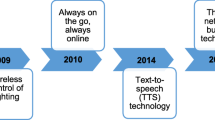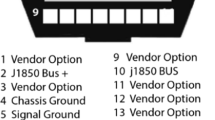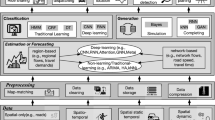Abstract
In order to reduce the fuel consumption of idling, lots of vehicles are equipped with idle start–stop system. In the actual traffic situation, heavy traffic result in frequent short time idle stop, which causes two major problems with the existing start–stop system, frequent starting and stopping and invalid stopping. That not only exacerbates component wear but also makes fuel efficiency worse. Aiming at this problem, an improved Markov model for idle time prediction based on spatiotemporal learning is proposed. Based on original Markov model, related training subset for training model is determined according time and space information, which could increase prediction accuracy by reducing the redundant noisy data. Experiments conducted on real urban dataset demonstrate that our proposed model could get better performance, the F1-measure increased by 8.0%. Start–stop strategy using the prediction method can make invalid idling reduced by 35.1%, which can effectively avoid invalid idling and obtain a reduction of frequent starting and stopping.










Similar content being viewed by others
References
Jou, R.C., Pai, C.W., Wu, Y.C.: Idling stop fines for exceeding legal idling times—from the driver’s perspective. Transp. Res. A 66, 88–99 (2014)
Xu, Z., Tao, N., Du, M., et al.: Damage prediction for the starter motor of the idling start–stop system based on the thermal field. SAE Int. J. Commer. Veh. 10, 10–18 (2017)
Ball, P.D.: Developing a start–stop production system concept. Procedia CIRP 26, 516–520 (2015)
Bishop, J., Nedungadi, A., Ostrowski G, et al.: An engine start/stop system for improved fuel economy. In: SAE World Congress and Exhibition (2007)
Fonseca, N., Casanova, J., Valdés, M.: Influence of the stop/start system on CO2, emissions of a diesel vehicle in urban traffic. Transp. Res. D 16, 194–200 (2011)
Wellmann, T., Govindswamy, K., Tomazic, D.: Integration of engine start/stop systems with emphasis on NVH and launch behavior. SAE Int. J. Engines 6, 1368–1378 (2013)
Ji, C., Yu, M., Wang, S., et al.: The optimization of on-board H2 generator control strategy and fuel consumption of an engine under the NEDC condition with start–stop system and H2 start. Int. J. Hydrog. Energy 41, 19256–19264 (2016)
Mueller, N., Strauss, S., Tumback, S., et al.: Next generation engine start/stop systems: “Free-Wheeling”. SAE Int. J. Engines 4, 874–887 (2011)
Yang, L., He, H., Sun, F., et al.: Research of fuzzy logic control strategy for engine start/stop in dual-clutch hybrid electric vehicle. In: Seventh International Conference on Fuzzy Systems and Knowledge Discovery. IEEE, pp. 912–917 (2010)
Chen, H.Y., Yu, X.L., Zuo, C.J.: A research on the control strategy of engine smart start/stop system. Automot. Eng. 9, 1145–1150 (2014)
Li, C.C., Chen, Q., Yu, F., et al.: A start–stop system for micro-HEV and the analysis on its effects on vehicle performance. Automot. Eng. 34, 879–884 (2012)
Lu, J.P., Li, Y.D., Lv, J.H., et al.: Control strategy of BSG vehicle idling start–stop system. Trans. Chin. Soc. Agric. Mach. 47, 316–322 (2016)
He, R., Liu, K., Huang, D.X., et al.: A study on the control strategy of intelligent idling stop and start system of engine. Automot. Eng. 32, 466–469 (2010)
Yu, Z.S.: Automobile Theory, 4th edn. China Machine Press, Beijing (2006)
Fathy, H.F., Kang, D.S., Stein, J.L.: Online vehicle mass estimation using recursive least squares and supervisory data extraction. In: American Control Conference (2008)
Kokotovic, P., Khalil, H.K., O’Reilly, J.: Singular Perturbation methods in Control Analysis and Design. Academic, London (1986)
Diaz-Cabrera, M., Cerri, P., Medici, P.: Robust real-time traffic light detection and distance estimation using a single camera. Expert Syst. Appl. 42, 3911–3923 (2015)
Song, H.Y.: Research on the Automatic Image Annotation and Annotation Refinement Algorithms. Jilin University (2012)
Acknowledgements
This work is supported by Key Science and Technology Program of Jilin Provincial Science and Technology Department (Grant No. 20150204052GX).
Author information
Authors and Affiliations
Corresponding author
Rights and permissions
About this article
Cite this article
Kui, H., Bao, C., Li, M. et al. An improved Markov model for idle time prediction based on spatiotemporal learning. Cluster Comput 22 (Suppl 3), 7637–7647 (2019). https://doi.org/10.1007/s10586-018-2341-6
Received:
Revised:
Accepted:
Published:
Issue Date:
DOI: https://doi.org/10.1007/s10586-018-2341-6




